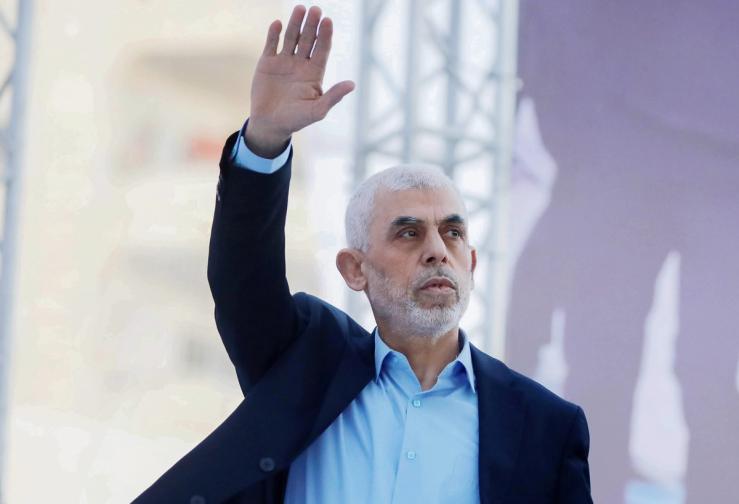The News
The Biden administration is publicly pressing the Palestinian militant group Hamas to surrender the masterminds behind its October 7 terrorist attack on southern Israel in what appears to be a coordinated attempt to split Hamas’ and the Palestinian leadership, which are scattered across the Gaza Strip and West Bank and regional countries such as Qatar, Turkey and Lebanon.
“If Hamas wanted to protect the people of Gaza, it could release the hostages, surrender the leaders and those responsible for October 7,” the White House’s point man on the Middle East, Brett McGurk, told a gathering of Arab leaders and diplomats in Bahrain on Saturday.
President Joe Biden stressed the same point in an opinion piece published Sunday in the Washington Post on the Ukraine and Mideast wars. “If Hamas cared at all for Palestinian lives, it would release all the hostages, give up arms, and surrender the leaders and those responsible for Oct. 7,” he wrote.
The White House’s demand is almost certain to be ignored by Hamas, U.S. officials acknowledge. But they say it’s still important to initiate a process of holding the militia and political organization accountable for its assault last month that killed 1,200 Israelis. The Mideast region is deeply divided over Hamas, its status, and the way forward after the current fighting ends.
Nor is it clear if Prime Minister Benjamin Netanyahu’s government would accept a legal process to try the assailants. Israeli leaders are vowing to eradicate Hamas’s entire military and political leadership and signaling it will conduct targeted assassinations beyond the Palestinian territories. On Tuesday, an Israeli drone strike in south Lebanon killed a commander of Hamas’ military wing, the Al Qassam Brigades, according to local media.
But most of Hamas’ senior political leadership is based in Qatar and Turkey, both U.S.-aligned countries. And leaders from these countries have offered few signs that they’d be willing to hand over Hamas members to Israel or the U.S., potentially to face charges of murder or kidnapping. Turkish President Recep Tayyip Erdogan has publicly hailed Hamas as a “liberation” movement since October 7, and Qatar said it intends to continue hosting Hamas’s political office in Doha.
U.S. and Middle East officials said it’s too early to discuss specific steps to hold Hamas’ leadership accountable. But one official involved in the deliberations said the International Criminal Court could be a potential venue to try cases.
Jay’s view
Israel and the Biden administration have equated October 7 to the September 11, 2001, terrorist attacks on the U.S., and Hamas to the Islamic State, or ISIS. (Dozens of American citizens were also killed in the assault last month.) But Mideast leaders, and even many American allies, aren’t demonstrating support for the type of expansive counter-terrorism operations against Hamas that the U.S. pursued to degrade both al Qaeda and ISIS during the 2000s. That constrains Washington’s and Israel’s options.
Some current and former Israeli officials told me their country’s response to last month’s attack could be similar to their operations after the 1972 Munich Olympics, when Palestinian terrorists murdered most of the Israeli national team. Israel’s spy agency, Mossad, tracked and assassinated members of the Palestinian cell, known as Black September, for decades. This included sending hit teams to neighboring countries like Jordan and Lebanon, but also deep into Europe.
“I should be clear: Israel is determined to kill them all,” Yaakov Amidror, Prime Minister Netanyahu’s former national security advisor, told me this week. “How and when? It’s a question of capabilities and intelligence. But at the end of the day: We will kill them.”
Many Mideast countries, including Saudi Arabia, Egypt, Jordan and the United Arab Emirates, have had their own conflicts with Hamas and other Iranian-backed militias in the Mideast, known as the Axis of Resistance. Riyadh and Abu Dhabi fought a years-long war against the Houthi militia in Yemen, which has supported Hamas in recent weeks by firing missiles at Israel. But the mounting death toll in the Gaza Strip, and Hamas’ central role in the Israel-Palestinian conflict, has sparked sharp condemnation of Israel’s war tactics by many of these countries.
“No, you cannot compare Hamas to ISIS,” Jordan’s Foreign Minister Ayman Safadi said last weekend in Bahrain. “You know, we all condemn the killing on October 7. But those broader characterizations seem to ignore the fact that Hamas did not create the conflict. The conflict created Hamas.”
In this environment, the status of Hamas’ leadership could get subsumed into a broader international effort to renew the Arab-Israeli peace process after the current Gaza war ends. President Biden and the White House have backed Arab calls of the fundamental needs for the creation of the Palestinian state. And Hamas, as an organization, would be hard to exclude from the process.
The View From The Palestinian Territories
Three Palestinian human rights groups said this month that they are asking the International Criminal Court to investigate Israel for allegedly committing war crimes in the Gaza Strip. The organizations – Al Haq, Al Mezan, and the Palestinian Human Rights Center – citing the bombing of densely populated civilian areas and the displacement of Palestinian populations. “These actions amount to war crimes and crimes against humanity, including genocide and incitement to genocide,” they said in a joint press statement.
Israel is not a member of the Hague-based court and says it doesn’t recognize its jurisdiction.
Notable
- In 2010, a Mossad hit team used fake identifications and disguises to assassinate a senior Hamas leader, Mahmoud al-Mabhouh, in Dubai.


